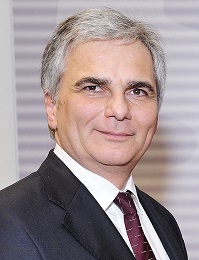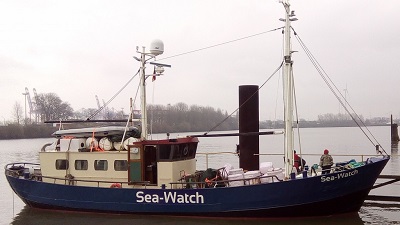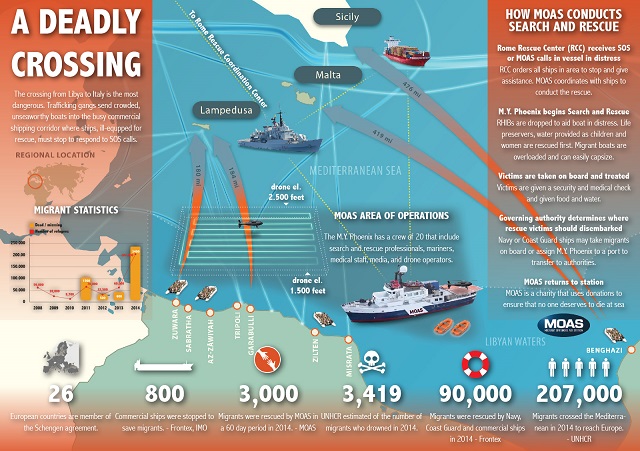10 Migrants Die, 4,800 Rescued
.jpg)
About 4,800 migrants were plucked from boats off the coast of Libya over the weekend and 10 bodies were recovered, Italy's coast guard and navy said, in what looked to be the biggest rescue operation of its kind so far this year.
Two weeks after nearly 900 boat people drowned in the worst Mediterranean shipwreck in living memory, the flow of people desperate to reach a better life in Europe has accelerated as people smugglers take advantage of calmer seas.
Seven bodies were found on two large rubber boats packed with migrants and rescuers plucked from the sea the corpses of three others who had jumped into the water when they saw a merchant ship approaching, the coast guard said.
.jpg) Separately, authorities in Egypt said that three people died when a migrant boat attempting to reach Greece sank off its coast. Thirty-one people were rescued.
Separately, authorities in Egypt said that three people died when a migrant boat attempting to reach Greece sank off its coast. Thirty-one people were rescued.
Some 10 Italian vessels, four private boats and a French ship acting on behalf of the European border control agency took part in the rescue off Libya, coordinated by Italy, the country that receives the biggest number of Mediterranean migrants.
The private Migrant Offshore Aid Station, which runs one rescue ship in partnership with Doctors Without Borders (MSF), said on Twitter it had saved 369 migrants, mainly from Eritrea, from a single overcrowded wooden boat.
Disagreement
Growing lawlessness and anarchy in Libya - the last point on one of the main transit routes to Europe - is giving free hand to people smugglers who make an average of 80,000 euros ($90,000) from each boatload, according to an ongoing investigation by an Italian court.
Libyan state news agency Lana said on Sunday authorities there detained 500 migrants in five boats off Tripoli and a further 480 migrants - from Sudan, Somalia, Eritrea and Ethiopia - were caught in a farm near the central town of Jufra, and another 170 were detained nearby.
Those rescued in the Italian operation were being brought to Italian shores, some already arriving at Lampedusa, Italy's southernmost island, and others at Trapani, Sicily. More were to be brought ashore overnight and on Monday.
Shocked by last month's record disaster, European Union leaders agreed to triple funding for the EU sea patrol mission Triton, but there is still disagreement on what to do with the people fleeing conflict and poverty in various parts of Africa and the Middle East.
 Austrian Chancellor Werner Faymann said in a newspaper interview on Sunday that the EU should set up a quota system whereby member countries agree to take in more refugees in order to relieve some of the pressure on Italy, Greece and Malta.
Austrian Chancellor Werner Faymann said in a newspaper interview on Sunday that the EU should set up a quota system whereby member countries agree to take in more refugees in order to relieve some of the pressure on Italy, Greece and Malta.
But Austria's proposal is likely to face tough opposition from some member states, including Britain and Hungary.
Hungarian Prime Minister Viktor Orban said on Friday that EU states should be allowed to set their own rules on migrants, and that Hungary did not want any of them.
Mild spring weather and calm summer seas are expected to push total arrivals in Italy for 2015 to 200,000, an increase of 30,000 on last year, according to an Interior Ministry projection. Almost 2,000 are estimated to have perished during the crossing already this year.
Sea-Watch
 Human Rights at Sea is supporting the efforts of the German based Sea-Watch project whose aim is to assist in the rescue of migrants in the Mediterranean Sea. The boat deployed will supply drinking water, food parcels, life jackets, medical aid and where possible, in case of acute distress, use of life jackets and life rafts. The team will notify authorities of any incidents and will also make use of the AlarmPhone system.
Human Rights at Sea is supporting the efforts of the German based Sea-Watch project whose aim is to assist in the rescue of migrants in the Mediterranean Sea. The boat deployed will supply drinking water, food parcels, life jackets, medical aid and where possible, in case of acute distress, use of life jackets and life rafts. The team will notify authorities of any incidents and will also make use of the AlarmPhone system.
HRAS support comes from one of its interns, Daniel Shepherd, and who will be regularly blogging the Sea-Watch experiences as they deploy from Hamburg to Malta and then on into the Mediterranean. The Sea-Watch project will initially operate for three months.
MOAS operation
MOAS has committed to a six-month presence at sea with the partnership of MSF. “As others discuss the pros and cons of saving migrant lives, we remain adamant that nobody should be left to drown,” said MOAS director Martin Xuereb.
“Last year we rescued 3,000 people over 60 days. This year we will be out at sea for a six month period in which we will continue to assist those who for one reason or other feel compelled to undertake the treacherous journey across the Mediterranean. This year we have also partnered with MSF to enhance our post-rescue assistance. We’re extremely proud of being able to offer our expertise and assets to the Italian and Maltese rescue coordination centers in our common quest to save lives.”
The MSF emergency medical team on board the Phoenix, comprising two doctors and a nurse, will have the necessary skills, equipment, and medications to treat a wide range of conditions from sunburn and dehydration to resuscitation and advanced life support. Staff will also offer primary health consultations, treatment for chronic illnesses like diabetes and heart disease, and obstetric services, including safe delivery as required.
Phoenix will patrol an area closer to the Libyan border than the areas patrolled by EU border control vessels. MOAS is an NGO which rescued some 3,000 migrants from the Mediterranean Sea during a 60-day mission in 2014, using the Phoenix, a 40-metre rescue boat equipped with a search and rescue crew of 20, RHIB rescue boats and helicopter drones.

